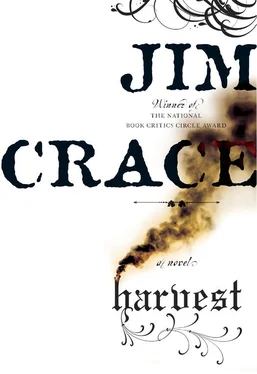Of course, the loudest voices are the ones that want to arm themselves with sticks and blades and march up to the manor house like maddened geese to save their goslings from the law. But they are only honking, making warning sounds. Nobody wants to storm the manor house, not with Master Kent inside, not with the echoes and impressions it has hoarded in its corridors. Besides, those three sidemen look menacing. They will be used to seeing off a crowd, the angrier the better, for then the greater their excuse for banging heads, and breaking bones, and leaving scars and bodies.
Some other neighbors say it’s best to let the evening run its course: the master’s bound to intercede on their behalf. There’ll be some displeased questioning of the women, no doubt. There’s been a scuffle, after all. And who can say that Kitty Gosse and Anne Rogers weren’t too fierce and fiery in the lane? That’s no surprise. It might be wise to let the matter boil and steam tonight. It makes no sense to lift a scalding pan. It’s best to let the water settle first, and cool. So, wait, is their advice. The three arrested villagers will be home by midnight, or by tomorrow midnight at least, and none the worse for wear.
It is the Saxton cousins, those two comic grunters who were once so famously divided by the partition of a pig, who suggest the favored strategy. They will not arm themselves. They will not wait like children while the water cools. Instead, they will present themselves at the manor house tonight — at once — as meekly as they can. They will wear smiles, remove their caps, and let the masters understand that any troubles that have occurred in these past days have been the work of newcomers and that they propose tomorrow, at first light, to search the alcoves of their land until the culprit — here they mean Mistress Beldam — is caught or driven far away or the victim of an accident.
I am not there to witness their entreaties at the manor, nor to make my own appeal for Kitty Gosse, as I should, because when we reach the unbuilt gateway to our unbuilt church, I discover Mr. Quill — as was arranged this afternoon, though in the mêlée I’ve forgotten it — in conversation with the one surviving tenant of our pillory. It is his third night fastened here. My neighbors do not even pause or lift their caps for either of the men; their business at the manor house is more urgent. But there is a stifled, communal cry and a shaking of heads. The night is swarming with a hundred tuts. Clearly they’re unsettled and displeased to discover this new conjunction, these two contrary outsiders unified in whispering. They see that Mr. Quill has spread his arm across the young man’s shoulder. They see the gap between the mouth and ear. And it is disturbing. Yet every one of them will admit in their heart of hearts that we have not been just to this ragged, shaven visitor and certainly not to the older man, who died; his fate is far too cruel to contemplate. That is why no one has come in these few days to throw windfalls at the remaining captive or to cuss at him, for fun, as would have happened if he were genuinely culpable of anything more serious than not belonging here. And that is equally the reason why none of us has been more kind, offering to share his burden of bereavement, a crust and rind, at least, a gift of ale. A greeting, anyway. A wave. We’ve been ashamed, I think. And bewildered, truth be told. Bewildered by ourselves. These are not the customary village ways. Our church ground has been desecrated by our surliness. Our usual scriptures are abused. This body on the cross is not the one that’s promised us. Yet, once again, it’s Mr. Quill who teaches us our shortcomings. It’s Mr. Quill who’s intimate and kind. It’s Mr. Quill who’s valiant. It will not make him popular.
The woman and the man are husband and wife, Mr. Quill explains as we settle down with churchyard stones as our bench for our long wait for Mistress Beldam to appear. They are fugitives from sheep, exiles from their own commons, six or seven days away on foot. They’ve come to us because their ancient livelihoods have been hedged and fenced against their needs. And the man who died was Beldam senior, her father. This, I suspect, is information neither of us has hoped to hear. Our imaginations have been fed by having her as a sister and a widow, a woman, that’s to say, free of ties and so within our grasps. We are, the pair of us, one bachelor, one widower, unspoken for — but now we are required to feel less ravenous. A married woman’s out of bounds, in principle at least. But, though I cannot speak for Mr. Quill, my attraction for the woman, based on that glimpse of her in the lamplit dancing barn and on the recent sight of her blood-soaked shawl, has not abated but only quickened at the knowledge of her kinship to this man. The marriage of an older woman to a thin-bearded youth is something that appeals to me. I can imagine being younger, being him … well, I will stop. These are the stories that we tell ourselves and only ourselves, and they are better left unshared.
Except I cannot stop. I find myself too keen to catch the woman stepping through the night. I can see her stretching on her toes to kiss the cheek and ear where just a while ago Mr. Quill almost pressed his lips. I can see her kneading all her husband’s muscles and his joints, to drive away the stiffness and the pain of three nights hanging on the cross. I can see her taking from a wrap a supper she has foraged from the woods — there’s apples there aplenty now, and blackberries, and game. And I can hear them whispering: she’s saying that his sentence is almost half served and that he must endure; she’s saying how our village will be punished for its sins; she’s promising the fire they lit to stake their claim on common ground will be remade and lit again; she’s drawing bows and firing arrows at the night; she’s making love to him.
Mr. Quill is silent too. His hands are gripping tightly onto his knees. The moonlight catches us infrequently tonight but when it does I see the paint stains on his fingers and knuckles — some blues and greens, some luster work — and I can tell that apart from his plain cap he has dressed himself in finer and more gentlemanly clothes than those he wore for me this afternoon. He’s like a decorated strippling at a fair, come to spy himself a girl. We sit like this in brewing silence for a while, busy with conjectures of our own and only lifting our heads slightly whenever we’re disturbed by snapping twigs, a shifting animal, a bat, the hint of footsteps coming close, raised voices from the manor house, and all the usual, rowdy ardors of a fading summer night.
It is, I think, the husband who hears her coming first. The top beam of the pillory rattles, bone on wood, as he tries to turn his shoulder and his head. I do not know if he’s aware that Mr. Quill and I are sitting only twenty paces from his back. I do not know what Mr. Quill has said to him or what arrangements they have made, if any. I wouldn’t be surprised if Young Beldam (he has a name of sorts, at last) calls out to her. A warning. There are other men about, he’ll say. Best run. But he says nothing, only whistles lightly, no more than the whistle of a breeze. I think he wants to let her know, as she comes close, that he still has breath in his lungs. She will not find another corpse.
Mr. Quill touches the back of my hand with a single finger and lifts his chin to point toward our left, where beyond our tumble of stones the church ground falls away a little into a ditch backed by thorn scrub and sore-hocks and, then, the groping nighttime silhouette of trees. He cocks his head. I do the same, until I hear the rustling. It could be another roaming pig, come to feast on someone else’s shins, but it’s too delicate and purposeful.
Читать дальше












